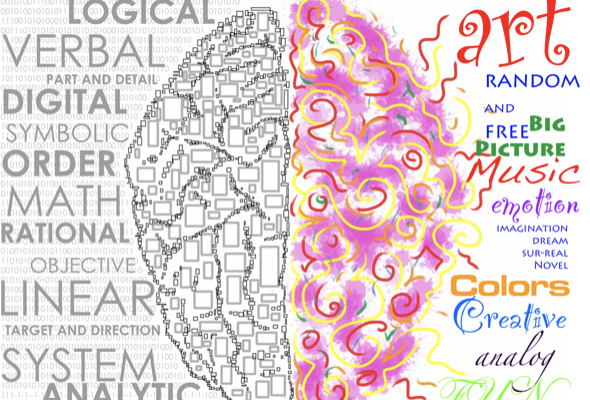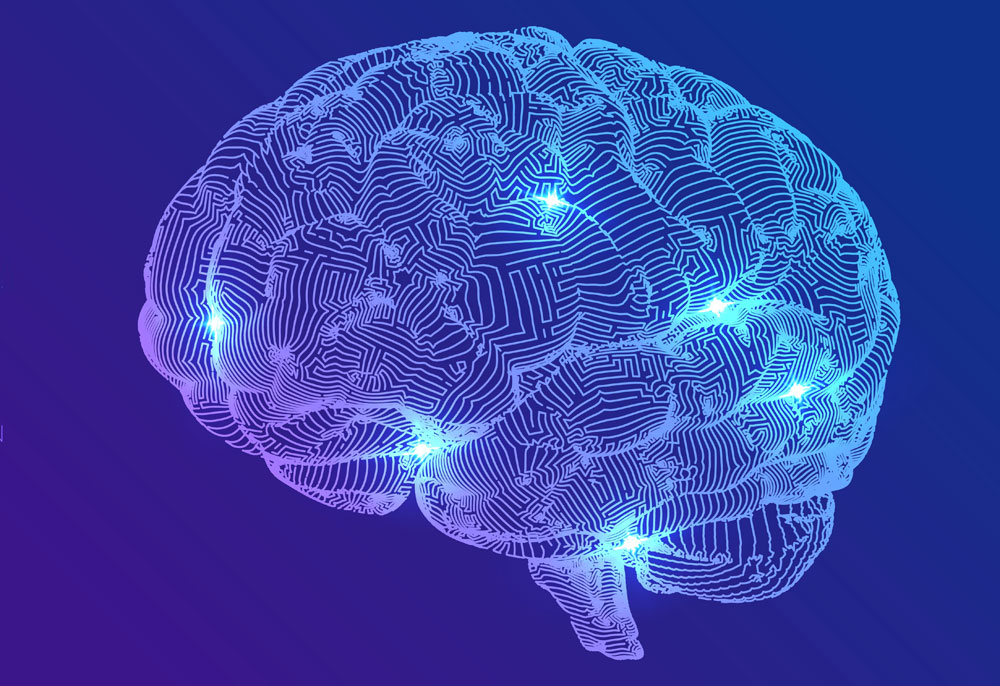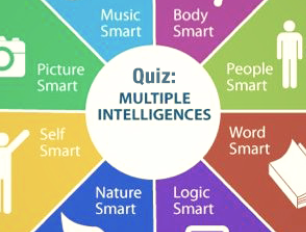Psychologists Say There Are 9 Different Kinds Of Intelligence. What Type Do You Have?

image via – shutterstock.com
If you’re a psychologist, professor, and researcher at one of the world’s most prestigious universities then you’re likely very intelligent. Howard Gardner is all of that and happens to work at Harvard University’s Graduate School of Education where he studies, of all things, intelligence.
Over the years he’s done brain research and interviewed all sorts of people, from geniuses and prodigies to victims of stroke and those with autism. His work eventually led him to develop the theory of Multiple Intelligences (MI Theory for short) which challenged traditional beliefs and definitions concerning what intelligence means.
Traditionally, intelligence is viewed as a fixed amount of cognitive capacity that people are born with. It consists of only logic and language abilities, and a person’s intelligence level can’t be changed over their lifetime. Gardner’s MI Theory stands in direct contrast.
Instead, he posits that individuals have different amounts, abilities, and unique combinations that can be changed and improved upon throughout their lifetime. The most distinctive aspect of his theory is that instead of there being only 2 types of intelligence, there are nine.
These 9 types directly relate to the various ways in which people interact with the word and environment around them. When Garder’s theory is applied to the classroom level a child’s strongest intelligence is first figured out. Then a teacher can more effectively reach and teach different that child in accordance with their intelligence. The nine intelligences are as follows:
1) Verbal/Linguistic- people who display good reading, writing, speaking, listening, memorization, and other language related skills. Students with these abilities are successful in most classroom settings because traditional teaching methods cater to these strengths.
2) Mathematical/Logical- this type of intelligence has to do with numbers, logic, reasoning, abstract and critical thinking. Those who more easily pick up on the underlying causes and principles of patterns and sequences also do well in traditional teaching settings.
3) Visual/Spatial- people who learn visually and spatially better understand maps, tables, charts, graphs, illustrations, and puzzles. They are often good at art and learn better by seeing things which helps them to understand and grasp concepts.
4) Musical/Rhythmic- people who are sensitive to different aspects of sound tend to learn well through music. They have an ear for tone, rhythm, meter, melody, pitch, and often excel at musical endeavors like singing, composing music and playing instruments. Traditional education doesn’t suit them well.
5) Bodily/Kinesthetic- this area relates to those who learn best through hands on activities like games, building stuff, and moving around. Jobs that require more physical activity are best suited for people with bodily-kinesthetic intelligence and athletes, soldiers, builders, surgeons often display it. Kids who learn this way are often seen as hyper and overactive, they don’t fit well traditional classroom settings.
6) Intrapersonal- people who are self-reflective and inwardly focused on their ideas, values, and feelings are this type of intelligent. From the outside they appear reserved, yet they are very intuitive and have a deep understanding of their own self worth. They learn best by taking information and examining how it relates to themselves.
7) Interpersonal- people who are talkative, outgoing, social, and empathetic learn best in groups or with partners. They are better able to sense others feelings, moods, and motivations and can thus connect more easily and better with people. They often excel at discussions and enjoy long conversations. People with high interpersonal intelligence make good managers, politicians, teachers, and salespeople.
8) Naturalist- this type of intelligence has to do with the natural world and those who see, pick up on, and understand various types of flora and fauna. People who love animals, gardening, and exploring nature, and who can relate information to their natural surroundings, have natural intelligence.
9) Existentialist- this type is related to philosophy. People who are deep thinkers and who question everything about existence are existentially intelligent. They pose questions such as “why are we here” and “what is our purpose” and are related to the possibility of additional types of intelligences that are spiritual or religious oriented.
Please Share This With Your Family and Friends
Can You Answer These Thoughtful IQ Questions Correctly?

image via – shutterstock.com
IQ, which stands for intelligence quotient, is the supposed measurement of a limited sliver of the wide range of human intelligence based on the score resulting from specific standardized tests. About two thirds of the population have an IQ between 85 and 100, with about five percent scoring above 125.
Although IQ tests do not measure all types of intelligence, they are useful in that they create a standard by which intelligence can be compared amongst the population, which is useful in many fields of scientific study and education.
Scientific studies have shown links between a person’s IQ and that of their parents, showing that it is a genetically inherited trait to some degree. It has also been discovered that many populations have had a steady increase in IQ over time, which is called the Flynn Effect.
Since the early 1900’s, there has been an average IQ increase of three points per decade. IQ testing continues to be a helpful tool in the field of human intelligence research. One might argue that its use in education or in job placement might help to create pre-conceived notions that limit a person before they even have a chance, but it is also beneficial because it can allow individuals the different attention they might need.
For example, it can help in discovering learning disabilities or aptitudes that otherwise might have taken some time to notice, allowing a person to be placed in a more appropriate environment for their learning needs.
Some scientists believe that social IQ, rather than quantitative intelligence, is the driving force for the evolution of the human brain and therefore intelligence in general. Social IQ, according to its proponents, more accurately defines human intelligence since we are social creatures for whom successful human interaction can mean the difference between survival and its opposite.
Prior to our modern society, a person who would score high on an IQ test, but has low social IQ would be less likely to survive because they would be more likely to be ostracized by their group.
Take the test and find out if you can answer correctly! Let us know your results!
Please Share This With Your Family and Friends
Which Intelligence Is Your Most Dominant?

image via – playbuzz.com
Intelligence has always been a controversial subject. Historically, we have had a rather myopic view of the subject, and our supposed measurements of intelligence were very limited in the type of intelligence they reference. We have since learned that intelligence is harder to pigeon hole than we previously thought. According to Howard Gardner of Harvard University, there are seven types of intelligence. Each person may have a balanced mixture of the various types, or they may be very strong or weak in one or more aspects.
Visual-spatial intelligence has to do with how well a person is able to think in terms of the physical environment. People who are strong in this type of intelligence do well with graphs, models and other spacial, physical learning tools.
People who have strong musical intelligence work best with rhythm and sound. They are very aware of the sound that constantly surrounds them and may learn best by putting things to a rhythm, turning information into lyrics, or having music on in the background.
Intrapersonal intelligence refers to how well a person understands themselves, including their own mind and emotions. They tend to be loners, but they have wisdom and insight that results from a strong inner search into their own psyche.
Strong interpersonal intelligence, on the other hand, helps a person interact with their fellow humans because it allows one to understand the social cues of others. They are good at learning through interaction.
Bodily-kinesthetic intelligence is described as an aptitude for bodily movement, which would be beneficial for a dancer or surgeon. They are very aware of their bodies and learn well by touching and feeling the subject matter.
Linguistic intelligence has to do with the ability to use language effectively. They often think in words, rather than pictures, and are often auditory learners that do well when material is offered in written form.
Finally, someone with high logical-mathematical intelligence is able to calculate and reason to a higher degree than the rest. They do well when things are explained logically and with supportive numerical data. Seeing patterns and thinking conceptually are strong points.
What type of intelligence is strongest for you? Let us know!
Please Share With Family and Friends
Do You Have An IQ That Is Over 140? Try To Solve This Puzzle and Find Out!

This intelligence test has been making the rounds on the internet and has already been shared well over three million times and counting. It’s also being claimed that if you’re able to solve and understand it then your IQ is above 150, which means you’re a genius.

On average, two-thirds of IQ test takers score anywhere between 85 and 115, and just 5% of people score over 125. A score of 140 or more would put you in the realm of the brightest, most intelligent minds on the planet!

Take a look at the puzzle below and see if you can figure out the pattern in the numbers shown. If you can’t solve it then check out the video from the MindYourDecisions YouTube channel which goes over how to arrive at the answer and the rule of reasoning behind it.

Even if you are able to solve the puzzle, do you understand exactly how you arrived at the answer and could you prove the intelligence test rule behind it? If not, watch the clip to learn all about it and afterwards you will truly understand what the problem entails. Were you able to solve the puzzle? Let us know.

Please Share This With Family and Friends To See If They Can Solve The Puzzle 🙂




